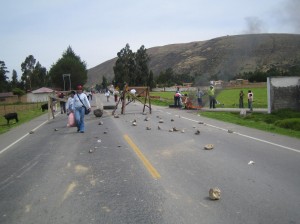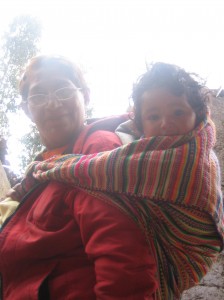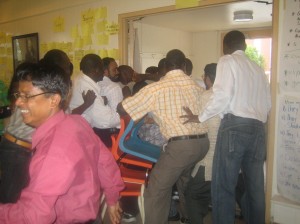Ohmigoodness! Thank you so very much for posting comments, guys! It totally makes me feel all warm and fuzzy inside (i.e. I really feel the support).
Today we began a two-day workshop with a facilitator from the Canadian government’s Centre for Intercultural Learning (CIL). All internships funded by the Canadian International Development Agency (CIDA) have this two-day preparatory workshop, but most only have these two days before being sent off to their host countries so I’m glad we have an entire month to get in the groove. I’m so happy to have these opportunities to discuss cross-cultural issues, especially because I feel a little bit like the underdog without a background in international development. It’s especially exciting to engage in discussions with the other interns because they’re so well-traveled, well-read, and have well-developed opinions but are still very open-minded.
We played a card game in the beginning that really initiated a lot of discussion. First, we sat in three groups and each group got a set of instructions to the card game – unbeknownst to us, each of three groups received a different set of instructions. During the game, we weren’t allowed to talk to each other and the trouble started when we had to rotate players. Without communication, the “new” member of each group had to figure out that there were different rules at their new table. It was supposed to be a microcosm of dealing with intercultural issues and it was interesting to see the different approaches people had. Some were laid back and just went with the flow even though they were confused that the rules were suddenly different and some tried to implement the rules of their original table even though everyone else at the new table were playing by a different set of rules.
I remember that at my table, one of the girls was trying to show us her way of playing the game even though the rest of the members of the table were playing by a different set of rules. I had the urge to take over and explicitly show her the rules of the table, but another guy at the table took a different approach before I could act. He has a really laid back personality and compromised by splitting up his “winning” cards between himself and the other girl to appease her. It was such a simple act that I hadn’t even thought of. I guess, sometimes, the best thing to do is to take it easy. There isn’t only one right way to do things and we certainly can’t be going to Peru with even the slightest attitude of superiority, assuming that our methods are somehow better than their existing way of living. No matter how many times I am reminded of this, I seem to continually catch myself in moments when I am subconsciously trying to enforce my beliefs, opinions, or ways of behaving. It helps that I am continually humbled by the other interns in this group.
I was talking to my sister yesterday night and realized that the tension and anxiety I’ve been feeling (and probably the reason that I’ve been having a hard time sleeping) is because this whole experience is really outside my comfort zone. Engaging in discussion on issues I’m really not familiar with, trying to delve deep into my limited life experience to produce relevant and insightful comments (this rarely happens). Being a “group member” almost 24/7 as we are always in a group during class, meals, and all the activities the interns organize afterwards whether they’re playing soccer, going for walks, chatting in the common room, or having Spanish conversation sessions.
But she also helped me realize that “the only person being hard on me is me.” All of the interns are inclusive, supportive, encouraging, understanding, and just downright nice. I guess I will only grow and change by stepping outside of my comfort zone in these ways.
It is a challenge every day, but that doesn’t mean I can’t and won’t be able to wake up every day and face that challenge. I always find running to be a good microcosm of life for me. Whenever I head out for a run in the morning, there are so many excuses running through my head, so many reasons I could conjure up to justify going back inside (it’s raining, there’s a stone in my shoe, a blister’s developing, I already ran yesterday). And while I’m running, I’m fighting the whole way to not stop before the length of time that I’ve set for myself. And the majority of the time, I get through it, and sometimes I’m even able to push myself further and run faster for a couple intervals. It seems that I have to have more faith in myself when it comes to daily life as well.





